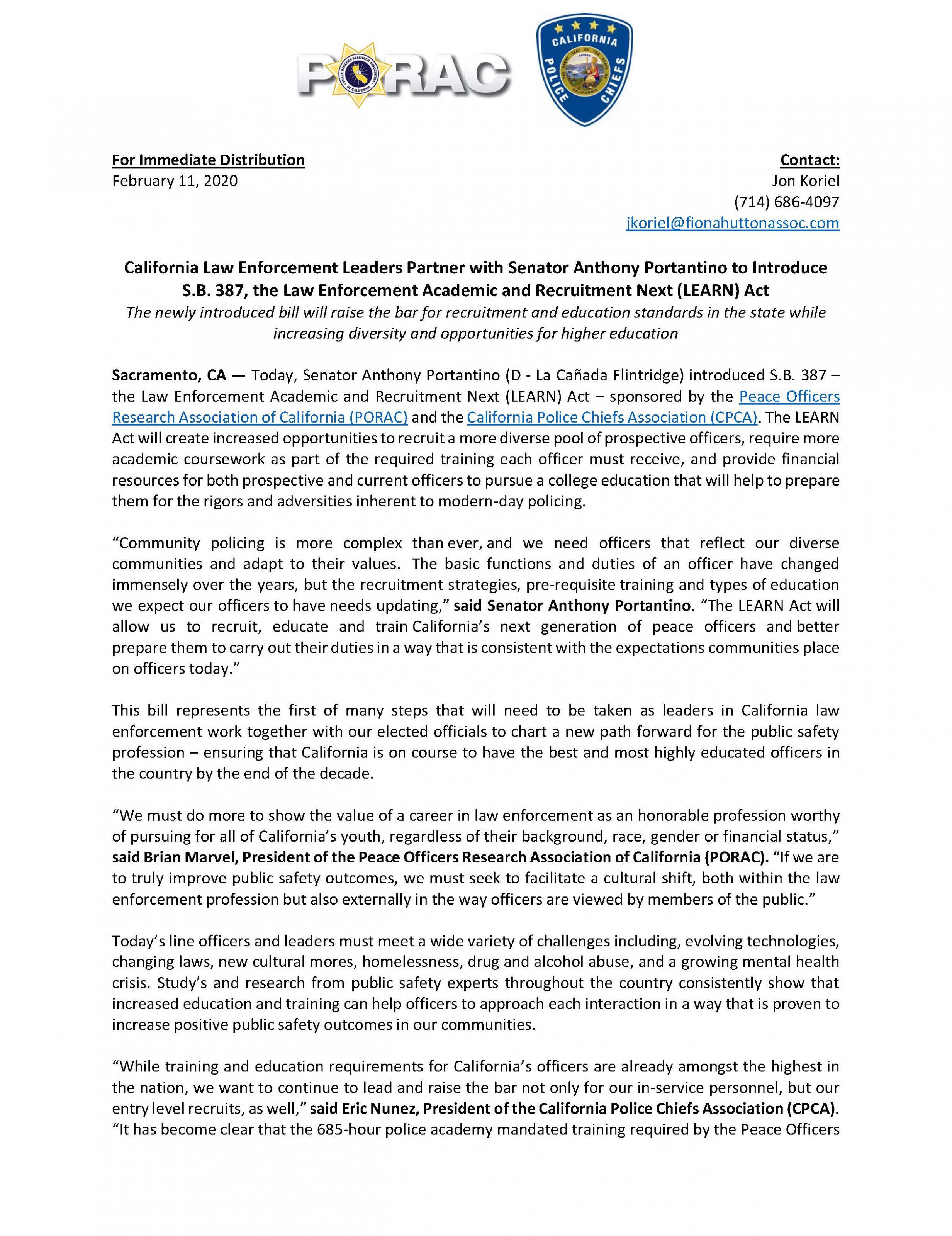The newly introduced bill will raise the bar for recruitment and education standards in the state while increasing diversity and opportunities for higher education

Sacramento, CA — Today, Senator Anthony Portantino (D – La Cañada Flintridge) introduced SB 387– the Law Enforcement Academic and Recruitment Next (LEARN) Act – sponsored by the Peace Officers Research Association of California (PORAC) and the California Police Chiefs Association (CPCA). The LEARN Act will create increased opportunities to recruit a more diverse pool of prospective officers, require more academic coursework as part of the required training each officer must receive, and provide financial resources for both prospective and current officers to pursue a college education that will help to prepare them for the rigors and adversities inherent to modern-day policing.
“Community policing is more complex than ever, and we need officers that reflect our diverse communities and adapt to their values. The basic functions and duties of an officer have changed immensely over the years, but the recruitment strategies, pre-requisite training and types of education we expect our officers to have needs updating,” said Senator Anthony Portantino. “The LEARN Act will allow us to recruit, educate and train California’s next generation of peace officers and better prepare them to carry out their duties in a way that is consistent with the expectations communities place on officers today.”
This bill represents the first of many steps that will need to be taken as leaders in California law enforcement work together with our elected officials to chart a new path forward for the public safety profession – ensuring that California is on course to have the best and most highly educated officers in the country by the end of the decade.
 “We must do more to show the value of a career in law enforcement as an honorable profession worthy of pursuing for all of California’s youth, regardless of their background, race, gender or financial status,” said Brian Marvel, President of the Peace Officers Research Association of California (PORAC). “If we are to truly improve public safety outcomes, we must seek to facilitate a cultural shift, both within the law enforcement profession but also externally in the way officers are viewed by members of the public.”
“We must do more to show the value of a career in law enforcement as an honorable profession worthy of pursuing for all of California’s youth, regardless of their background, race, gender or financial status,” said Brian Marvel, President of the Peace Officers Research Association of California (PORAC). “If we are to truly improve public safety outcomes, we must seek to facilitate a cultural shift, both within the law enforcement profession but also externally in the way officers are viewed by members of the public.”
Today’s line officers and leaders must meet a wide variety of challenges including, evolving technologies, changing laws, new cultural mores, homelessness, drug and alcohol abuse, and a growing mental health crisis. Study’s and research from public safety experts throughout the country consistently show that increased education and training can help officers to approach each interaction in a way that is proven to increase positive public safety outcomes in our communities.
“While training and education requirements for California’s officers are already amongst the highest in the nation, we want to continue to lead and raise the bar not only for our in-service personnel but our entry-level recruits, as well,” said Eric Nunez, President of the California Police Chiefs Association (CPCA). “It has become clear that the 685-hour police academy mandated training required by the Peace Officers Standards and Training Commission (POST) is not sufficient to cover all the new legislative requirements that have been established in recent years. We look forward to working with our elected leaders, law enforcement agencies and other stakeholders across the state to help develop and refine proposals that will place our officers in the best possible position to serve our communities the way our communities want to be served.”
The LEARN Act will set California’s next generation of peace officers up for success while helping to repair the trust that officers need to carry out their duties safely, effectively, and in a way that reflects our shared California values. The LEARN Act will:
- Establish statewide outreach teams comprised of active law enforcement, community members and educators.
- Actively share our experiences and provide younger students with the opportunity to learn from and ask questions about the role of law enforcement in our daily lives.
- Provide opportunities for older students to learn about how they can pursue both a career in law enforcement and a college degree.
- Establish a statewide law enforcement education fund to expand access to college degree programs for both prospective and current officers.
- Develop an expanded curriculum specifically designed to prepare officers to meet the expectations of a modern police force, including classes on mental health, social services, psychology, communication and more – a requirement for officers looking to move up in the ranks and to receive their intermediate and advanced POST certificates.
- Create the foundation for a modernized degree specific to policing for law enforcement that includes a multi-discipline approach to capture all the various skill-set requirements necessary of the modern police officer.
The LEARN Act represents the first in a series of legislative proposals that will collectively seek to define a pathway towards modernizing California’s police force. These policy proposals reflect CPCA’s and PORAC’s more than 120 years of combined institutional knowledge in advocating for victims’ rights, higher training and recruitment standards, body-worn cameras, more community-based policing and the elimination of quotas — to name a few. They are also the product of a survey of proven best practices from throughout the country and are rooted in research from public safety experts.
###
About the Peace Officers Research Association of California:
The Peace Officers Research Association of California (PORAC) was incorporated in 1953 as a professional federation of local, state and federal law enforcement agencies. PORAC represents over 77,000 public safety members and over 920 associations, making it the largest law enforcement organization in California and the largest statewide association in the nation.
About the California Police Chiefs Association:
Established in 1966, the California Police Chiefs Association represents municipal police chiefs and their agencies in California. Association members provide public safety for more than 26 million Californians. Cal Chiefs advocates for sound policy on public safety issues at the state capitol and has an active government relations program. In addition to its committees that focus on emerging issues and provide resources and sample policies to its members, Cal Chiefs provides professional development and training to police chiefs and seconds in command throughout the state.
